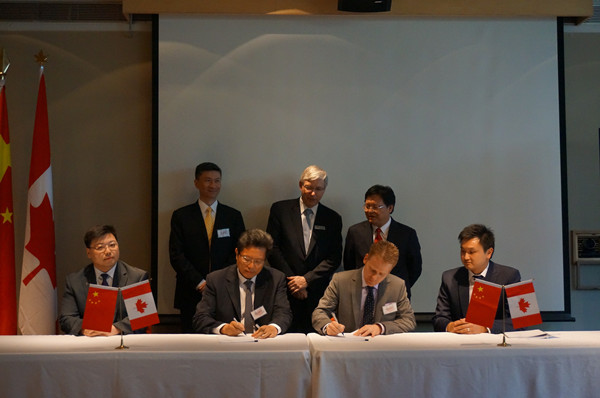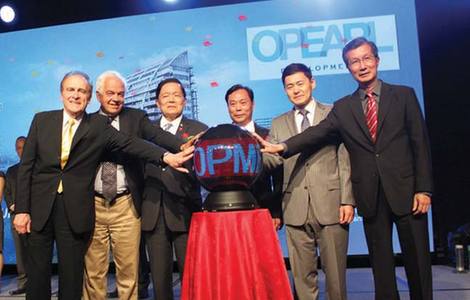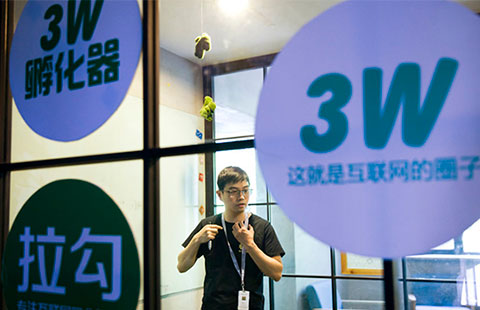Canadian company inks $10 million deal to power clean energy buses in China
Updated: 2015-06-11 06:37
By Wang Ru(China Daily Canada)
|
||||||||
 |
|
Randy MacEwen, Ballard President and CEO signed supply agreements with Chinese companies on Monday in Beijing. |
Ballard Power Systems Inc, a fuel cell producer from Canada, signed supply agreements on Monday with two Chinese companies to provide fuel cell power products and technology solutions to support the planned deployment of an initial 33 fuel cell-powered buses in two Chinese cities.
The deal has an estimated value of $10 million.
Ballard will collaborate with the two Chinese companies, Nantong Zehe New Energy Technology Co Ltd, and Guangdong Synergy Hydrogen Power Technology Co Ltd, to provide fuel cells to electric buses manufactures in Rugao in Jiangsu province and Yunfu in Guangdong province.
The municipal governments in the cities of Yunfu and Rugao plan to have fuel cell bus fleets operating in revenue service in 2016.
The agreement was signed at a ceremony held on Monday at the Canadian Embassy in Beijing and attended by Guy Saint-Jacques, Canada's ambassador to China.
Randy MacEwen, Ballard president and CEO, said "We continue to see strong growth opportunities in China’s mass transit market where fuel cells are increasingly being discussed as the next generation of clean propulsion. This demand is being driven by China’s growing need for clean urban mass transit and air quality policies."
Ma Jinhua, Member of Rugao Municipal Standing Committee of CPC said, "It is important that we deal with experienced, market-leading companies in order to ensure successful delivery with the most advanced technology. This is one reason that Ballard Power Systems is the right choice for a program of such importance."
The size and rapid growth of China's economy has resulted in considerably larger carbon dioxide emissions than other nations. In 2013, for example, China's carbon dioxide emissions from fossil fuels accounted for 29 percent of the global total, compared to 15 percent from the United States.
As a result of air quality issues, a new energy program was launched in 2011, involving 48 Chinese cities with an objective of expanding public transit while also reducing the number of vehicles in cities.
One of the program's specific goals is to deploy more than 1,000 clean energy buses in each of the participating cities, taking advantage of government subsidies to facilitate this expansion.
The Canadian hydrogen and fuel cell sector enjoys strong domestic and international recognition for producing cutting-edge, clean energy solutions that have profound effects on energy use across a variety of industry sectors – passenger vehicles and buses, stationary and back-up power, and materials handling.
Clean energy policy-makers and experts from Canada and China, as well as industry representatives, joined a conversation during the signing ceremony, exchanging their ideas based on the cooperation of clean technology between the two countries.
Former Counselor of the State Council and Secretary-General of Ministry of Science & Technology of China, Shi Dinghuan, now president of Chinese Renewable Energy Society, hosted the conversation.
Dai Yande, deputy director of the Energy Research Institute, National Development and Reform Commission, P.R. China, joined in the conversation, stating that China must keep its eye on energy efficiency and support the development of renewable technology.
Céline Bak, the Global Practice Lead and chair of the Sustainable Technology Private Sector Advisory Board for Canada's Department of Foreign Affairs, Trade and Development, outlined Canada's progress and challenges on sustainable energy.
"As China is the largest and still growing energy market in Asia, it has placed a priority on clean energy to support its ongoing efforts to grow, diversify its energy mix, and help address environmental and climate change impacts," said Saint-Jacques, the Canadian ambassador.
"As some of you may already know, Canada has one of the cleanest energy mixes in the world and is a global leader in clean technology. As such, it has many advantages to offer China based on numerous strengths," he said.
In 2014, Canada exported $202.3 million of renewable energy and energy infrastructure goods to China, while importing $2.2 billion from the Chinese side.
Canada and China have several bilateral working groups focused on promoting deeper cooperation in the areas of sustainable technologies and the environment.
The Canada-China Energy Working Group, in particular, aims to facilitate a platform for increased dialogue and cooperation between Natural Resources Canada and China's National Energy Administration, in the areas of energy, including renewable energy and energy efficiency.
- Exhibition displaying anti-Japanese war archives opens to public
- Key IS leader killed in Lebanon
- British PM hails UK-China relations
- Vice-premier promotes food sector ties with Italy
- Myanmar's NLD party leader leaves for her first visit to China
- Vietnam's top party leader expected to visit US next month

 Across Canada(June 11)
Across Canada(June 11)
 US dollar inspired art to be auctioned at Sotherby
US dollar inspired art to be auctioned at Sotherby
 Coffee shop where Premier Li met entrepreneurs
Coffee shop where Premier Li met entrepreneurs Cavs edge Warriors to take charge of finals
Cavs edge Warriors to take charge of finals
 Work hard, play hard - five ways to shake off exam stress
Work hard, play hard - five ways to shake off exam stress

Six co-investments by Jack Ma and Pony Ma

 Yes, we are waiting for our children
Yes, we are waiting for our children
 Chinese artist to be recognized at International Muse Awards
Chinese artist to be recognized at International Muse Awards
Most Viewed
Editor's Picks

|

|

|

|

|

|
Today's Top News
China, US take fresh views on TPP and AIIB
G7 accused of ignoring the facts over South China Sea
Obama weighs sending several hundred more US troops to Iraq
MSCI delays including China A shares in benchmark index
7 Chinese gay couples hold wedding ceremony in West Hollywood
New window on China
Prove hacking: experts
Amid tensions, top Chinese brass visiting US
US Weekly

|

|






